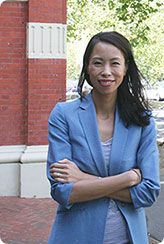
Victorian women with breast cancer will have new opportunities to take part in world-first clinical trials under the $1.5 million Colebatch Clinical Research Fellowship awarded to Dr Sherene Loi.
Dr Loi, a medical oncologist and scientist at the Peter MacCallum Cancer Centre, will use the five-year fellowship to explore how new targeted therapies can be tailored to an individual’s breast cancer. Her research will include an immunotherapy trial involving an anti-PD-1 antibody, which has already shown great promise in melanoma.
In this clinical trial, due to commence later this year, Dr Loi will focus on exploring modifiers of the immune response in breast cancer treatment for women with HER2-positive breast cancer.
Around one in five breast cancers, affecting 3000 Australian women each year, are characterised by overexpression of the HER2 protein — these cancers tend to be more aggressive than other tumours, and affect younger women.
“To make serious inroads against breast cancer, we need a better understanding of its genetic make-up, how cancer genes can affect the cure rates of anti-breast cancer therapies, and how cancer genes alter over time. Understanding this will allow us to anticipate changes, and potentially limit the ability of breast cancer to genetically evolve and evade treatment,” Dr Loi said.
“I hope my research will significantly benefit Australian women by providing them with access to effective new therapies, as well as identifying patients who are most likely to respond to these therapies.”
Since the start of her PhD studies in 2004, Dr Loi has had 60 original articles published, submitted or in press. She has spent the past decade in Brussels at the Breast International Group clinical trial headquarters; returning to Melbourne last year to head the new Translational Breast Cancer Genomics Laboratory at Peter Mac.
The fellowship was named in memory of Dr John Colebatch to mark his contribution to the Cancer Council and his work in the field of paediatrics. Dr Colebatch pioneered the use of chemotherapy in Australia in the 1950s to treat and, ultimately, cure childhood leukaemia.
This fellowship was enabled by a generous bequest from the Geary Estate.
Dr Loi said she was continually motivated in her work to find the next research “holy grail” by seeing the impact that breast cancer had on the lives of so many young women.
We are in an exciting time in oncology history where we have, for the first time, the tools available that allow a high resolution, in-depth view of the cancer genome for an affordable price. The opportunities for translation and personalised medicine within the next decade are immense and I am driven in my research to improve the lives of not only the women I treat, but women with breast cancer everywhere.”
Over the five-year fellowship, Dr Loi’s research will be broken into three stages:
- Enable real-time molecular characterisation of breast cancers to guide the selection of patients most suitable for clinical trials.
- Identify biomarkers of resistance and response to current therapies in breast cancer. Findings from these studies will advance biomarker development, increase potential for personalised medicine and inform future clinical trials; particular immune approaches.
- Investigate the genetic evolution from a primary tumour to metastatic disease by using a prospective longitudinal study of multiple tumour samples taken throughout the course of the disease within patients.
Fact
Breast cancer remains the biggest killer of women aged 35-54 in Victoria, as well as nationally. Each year, more than 14,000 Australian women are diagnosed with the disease. In 2012, this included 3693 Victorians.